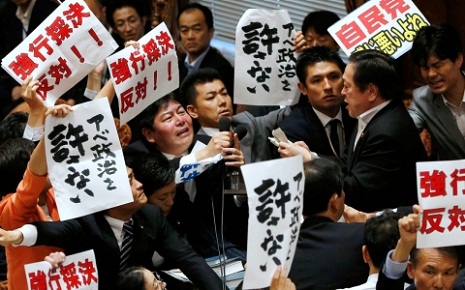Thousands of protesters took to the streets chanting and holding up posters reading "No War, No Killing" and "Don`t send our children to war."
"This is going to make it easier to go to war. It`s wrong," one protester who would only give her name as Murakami told NBC News. "I don`t understand complex things, but I know its wrong and that`s why I`m against it."
Critics of the bills claim they are unconstitutional. Japan`s military has maintained adopted an exclusively defensive stance — only allowing the use of arms if directly attacked — as part of its interpretation of the country`s post-World War II pacifist constitution.
As a result, while Japan has participated in overseas peace-keeping operations overseas for decades, assignments have been limited to offering logistical support in non-combat areas.
The biggest change under the new bills would allow Japan`s military to defend allies like the U.S. that come under attack, under a concept known as collective self-defense. Previous administrations have considered doing so unconstitutional.
President Barack Obama signaled his support for the changes when he met with Japan`s Prime Minister Shinzo Abe in April — though Abe`s moves to get the bills through have damaged his approval ratings.
According to public broadcaster NHK`s data released on Monday, 41 percent of those polled supported Mr Abe`s administration while 43 percent disapproved. And on the issue of the new security bills 61 percent did not support the change.
Last month, three constitutional scholars told a parliamentary panel that Abe`s approach to collective self-defense and the military measures were unconstitutional.
"It cannot be rationally explained under the previously held government position on this matter," Professor Yasuo Hasebe of Waseda University testified.
Abe has defended the policies in remarks on his party`s internet radio station, saying the bills "are not for engaging in wars" but the opposite.
"We are preparing ourselves in case we are attacked by a foreign nation," he said in one address. "By preparing ourselves, just like well-protected homes help prevent robbers, this will allow us to prevent wars. This is deterrence."
His message has been lost on many of the protesters in Tokyo brandishing banners in front of parliament.
"By upholding our constitution, I think we`ve earned the respect and trust from the world… and its something that has been carefully protected for 70 years," said Norikazu Hamada, 34. "If Japan becomes another regular nation which goes to war like the United States, Japan will lose its singular brand."
More about:
















































